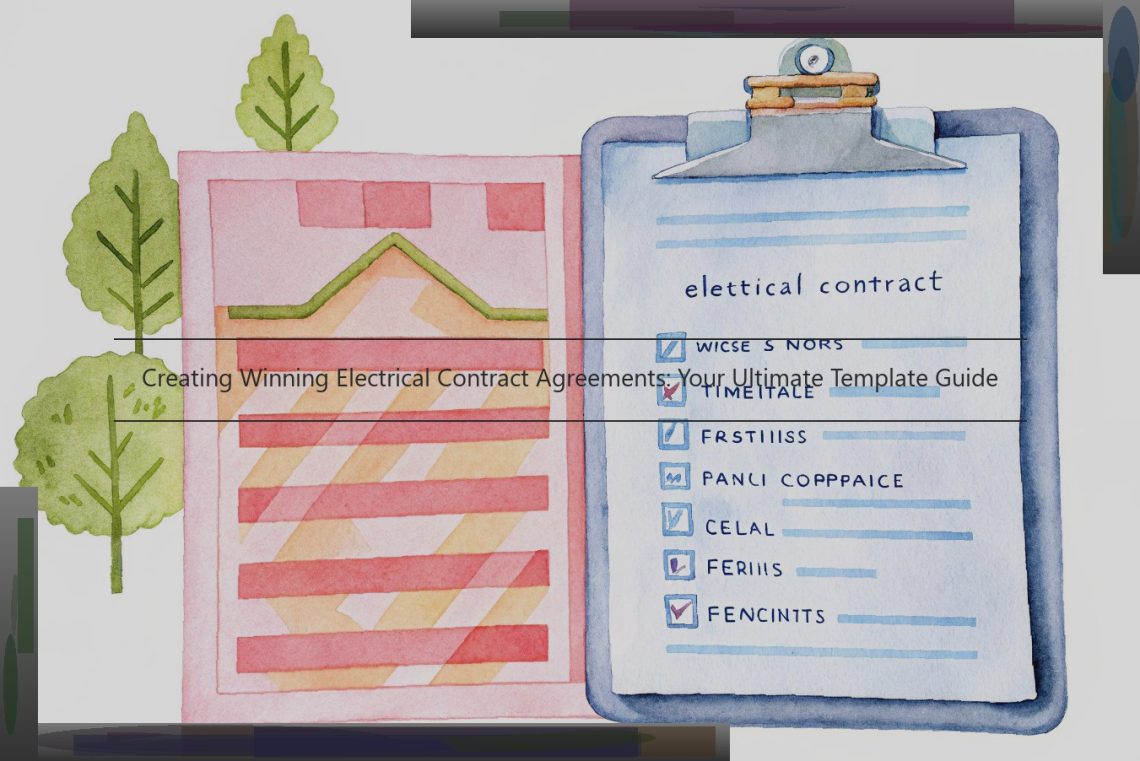
Creating Winning Electrical Contract Agreements: Your Ultimate Template Guide
Electrical Contracts Explained
The construction and services industry thrives on contracts. A written agreement helps to determine the terms of the work to be performed, when the work will be started and completed, and how much it will cost. In many cases, the contractor signs a contract with the client, who signs a contract with owners or other parties.
Each party to the contract has its own interests, so there are different kinds of contracts. This article clarifies some of the key elements of an electrical services contract and the relevant laws.
Basic Elements of an Electrical Contract
Every contract is unique, but all contracts have similar elements:
Electrical Contracts and the Law
When it comes to commercial and residential property, local, state and federal laws can impact the validity of a given contract. It is important to understand the relevant laws in each jurisdiction where the work will be done. Possible laws that could apply to any electrical services contract include:
Uniform Commercial Code (UCC) – The Uniform Commercial Code governs contracts related to the sale of goods, including wiring and fixtures . The UCC only applies if the contract is for goods and not for a job or service. If an electrician sells light fixtures and wires to a customer, the terms of sale would be governed by the UCC. But if the electrician agreed to wire the home, the UCC would not apply.
Regulated Industries – The construction industry is regulated by many laws. For example, certain industries and parties to contracts must comply with the provisions of the Colorado Regulated Industries Act, which contains detailed requirements for contracts. Other state and federal laws apply to specific regulated industries such as communications equipment.
Consumer Protection – Many states have laws like the Colorado Consumer Protection Act, which protect consumers from unfair, deceptive, fraudulent and illegal business practices. If there are contractual violations and damages, the remedies provided under the CPA could provide an additional ground for recovery.
What’s Included in an Electrical Contract
The contract for the installation of electrical work includes terms and conditions that describe the responsibilities of both the electrical contractor and the client. While the terms will change and vary from project to project, there are certain things that are common to every electrical contract agreement.
A scope of work is a description of work that is to be performed, usually in technical detail. For example, if an electrical contractor contracts to install a new lighting system in a commercial building, the scope would include all fixtures, dimmers, circuitry, relays, switches, connections, mounting, location, covering, and anything else that is relevant to the installation of the lighting system.
The timeline for an electrical job is very important. Electrical jobs often encounter delays for a number of reasons, including inadequate or unavailable electrical parts, weather problems, a mistake in the electrical drawings, a fire or flood occurring on an unrelated part of a building site, shipping problems or damage to electrical products. The timeline for an electrical job should take the above problems into account as well as any problem that may arise during the job.
There are four common types of payment for an electrical job: lump-sum payment, cost-plus payment, fixed unit price payment and reimbursement payment: Lump-sum payment is an arrangement that requires the client to pay a single price for the whole project according to the terms in the contract. Cost-plus payment is when a client pays all expenses plus a percentage of the actual expenses. In fixed unit price payment, the contractor pays a specific price for each item of work, whether for materials or labor. Reimbursement payment is when the client reimburses the contractor for direct costs of work on a documented basis.
Just about every trade requires some warranty for defects. A warranty applies to electrical work if the job turns out to be defective. There are many types and lengths of warranties and they should all be included in the terms of the contract. A big concern in an electrical warranty is that the contractor will not be available to repair defective work long after the work is finished.
Legal Aspects to Consider
Before finalizing any electrical contract, it is essential to ensure that it aligns with all relevant local, state, and federal laws. Regulatory compliance can range from licensing requirements to specific contractual stipulations concerning payment terms, scope of work, change orders, termination procedures, and liability concerns. Often, these regulations require consultation with state or local agencies, such as the state’s licensing board.
Obtaining the appropriate permits before project commencement is another fundamental requirement. Failing to secure proper permits can cause a host of complications, starting with a cease and desist order from local authorities. This can lead to expensive delays, as the contract may need to be reopened to accommodate possible relocation of fixtures or equipment, and it can also open up the prospect of litigation should a patron attempt to recover damages from a project which is now behind schedule, or if the Patronservice is attached to a piece of equipment or fixure that requires a replacement. To avoid this scenario, the electrical contract should clearly state who is responsible for obtaining all necessary permits and dealing with any permit-related issues, as well as ensuring that all inspected work is properly documented and signed off on where appropriate.
While permits are a necessary component of an electrical contract, they are but one aspect of safeguarding an electrical contract against failure. Another important consideration is mitigation of risk. All construction projects involve some risk of litigation or fault, and electrical contracts are no exception. Risk mitigation strategies will be unique to the project, but West Coast Trial Lawyers recommends building them into the contract’s language so that the parties are on the same page from the outset. Legal considerations must be taken seriously during the drafting process, yet the language should not be overly complex or technical. A clear and straightforward electrical contract is less likely to become mired in legal disputes and litigation.
Why a Template is Beneficial
A contract template is a proven tool to enhance the professionalism of your business practices and protect the interests of both parties. This is particularly true with electrical contracts, where in many cases, consumers have very little knowledge of the work involved, making them an ideal target for fraudulent practices. By using a contract template for all your electrical contract agreements, it helps to eliminate potential uncertainty while establishing a standardized agreement that ensures you’re getting paid fairly while providing the customer with the peace of mind they need to go forward with the project.
Efficiency
The most obvious major benefit to utilizing a contract template for your electrical contract agreements is in terms of efficiency. Writing a contract from scratch can be prohibitively time consuming, particularly because many of your clients will review the draft carefully, pouncing on any issues or errors, real or imagined, that they see. If there’s even the slightest discrepancy, they’ll want to argue their case which turns into more unnecessary negotiations that just prolong the process. By having a contract template already prepared, it will allow both parties to sign off quickly, and get to work in a matter of days rather than weeks.
Standardization
Using the same standardized contract with each client helps to ensure not only efficiency, but also consistency. This in turn improves professionalism, which can help improve your image and brand, build trust with your clients, and avoid confusion on your part, which can lead to different outcomes depending on the job and whether you were prepared for it or not. A contract template is a reliable, easy way to make sure everything is in order so that you can focus on what’s really important: delivering outstanding results to your clients.
Error Reduction
Finally, a contract template helps to reduce the risk of costly errors by making it easier to stay organized. Even when you’re doing something you’ve done for years, like installation of new electrical wires, there’s always the possibility of errors occurring. The fact that you’ve done the work hundreds of times before doesn’t guarantee you won’t make a mistake on a job. And when you’re writing contracts from scratch for each one, these mistakes are a virtual certainty. By having a contract template ready to go, it will eliminate mistakes made from fatigue or random typos. Instead, you’ll be able to put in all the necessary information directly into the template for each job, instead of writing the same details over and over again. This is the ideal way to streamline your process and improve your efficiency for all future electrical contract agreements.
Editing Your Electrical Contract Template
Adapting the electrical contract template to suit the specifics of your particular project is a critical step in ensuring the contract meets your unique needs. As you personalize the template, be sure to incorporate the parameters of the job, such as the following:
- The scope of work: When outlining your services, don’t forget the details, which can include rough-in inspections by local code authorities; panel and circuit installation; complete service overheads and undergrounds; trenching and duct banks; wire, cable and related hardware; marking circuit locations before insulation; all circuit breaker panels and subpanel installation; all switches and receptacles; all fixtures; and wiring from the meter to the main panel, from the main panel to the breaker panel and from the breaker panel to the various circuits. You should also specify the number of circuits and the amp service the panel will be.
- Schedule: Must a homeowner sign off on each phase before the job can move forward? If so, be sure to state that in the contract. Also specify whether or not the customer is responsible for notifying the utility company of the pending work; for example , the customer might be required to contact the utility in order to arrange to have power turned off temporarily, or to arrange for access to a meter if necessary to do the work.
- Pricing: Be sure to include payment terms in your electrical contract template. Payment can be made on a fixed-price basis, an hourly basis, or at different stages, such as down time before the job begins, progress payments completed upon receipt of inspection for each phase, and final acceptance of the entire project.
- Any limitations you have: Does your estimate include the cost of any permits, "expediting" fees or miscellaneous parts and supplies? If not – or if there’s a limit to how many of these items are included in the original estimate – spell this out in the contract and include an agreed-upon extra charge, such as 10%, in the event they do become necessary for the project. This will set customer expectations for potential cost variances.
- Delivery dates: When you will start working and when you will finish.
Pitfalls to Avoid
When drafting an electrical services contract, there are several mistakes service providers often make. The following tips will help you avoid those pitfalls: Avoid Common Industry Terms: While your trade may have its own lingo, it’s best to keep the agreement clear and free from industry jargon. Your clients may not be familiar with the vocabulary you use, and their lack of understanding can have two negative affects on your contract. First, the client may misunderstand your terms and either think that they’re getting something that they aren’t or not understand what it is you’re providing for them. Second, a client who does not understand the terms of their agreement may not feel confident in signing the contract and therefore turn you down. Don’t Assume You Can Skirt Local Laws With Contracts: Many service providers try to circumvent local laws with their contracts, believing that if they say they don’t guarantee a specific result and they state the customer takes responsibility for the outcomes of the services, then they can avoid liability for poor work. This is simply not the case. While it is a good idea to include these clauses, the majority of courts will not enforce them if there’s any evidence of negligence or other fault on the part of the service provider. Many municipalities go so far as to require licenses and bonds as part of the permitting process to ensure the work done meets specific standards. Failing to meet those standards will leave you exposed no matter how careful your contract was in that regard. Browsers are Not Readers: If your contract is 10 pages long but 90 percent of that page has no substance, your client is unlikely to read the entire agreement. They’re likely to judge their first impression and move on. Set the tone for the whole contract by being brief, concise and to-the-point. While it’s tempting to include everything in your electrical contract because of fears you’ll leave something out, don’t sacrifice quality for quantity. A good, short contract is much better than a long one the client will never read.
Sources for Reputable Templates
Choosing the right electrical contract agreement template is crucial for these projects. The quality and accuracy of the document largely determines the level of protection that it provides. Reputable industry associations, online law firms and legal professionals provide a variety of electrical contract agreement templates to help guide companies through the process. Offering some options to consider below:
National Electric Contractors Association (NECA)
The National Electric Contractors Association provides electrical contract agreement templates for both electrical general contractors and subcontractors. The templates offer agreement provisions and terms for a wide variety of services including master services agreements, unique project agreements and federal government project agreements. They are available for download as a MS Word or PDF file. For a small fee, the NECA even provides access to editable documents that will accept input for key contract provisions.
Association of General Contractors (AGC)
The Association of General Contractors offers a library of electrical contract agreement templates for different types of providers and services. AGC provides sample contracts and binding agreements . It also has contract addendums and letters of intent for download. Members can access the materials for free while nonmembers pay an annual subscription fee.
National Association of Electrical Distributors (NAED)
The National Association of Electrical Distributors offers electrical contract agreement templates that contain provisions for different trade services. Members of NAED can access the templates for free while nonmembers pay an annual subscription fee that includes access to this and many other resources.
Miller Law Group
In addition to providing free downloadable electrical contract agreement templates, Miller Law Group offers an edited version through its Partner Plus Electronic Agreements program. It’s a membership service that provides members with unlimited access to tailored electronic(signed) agreements and contracts, from business to commercial lease agreements, and beyond.
Conclusion
Before entering into negotiations or consulting with an attorney, providers should have a general understanding of the basics of electrical contract agreements, as well as their rights, obligations and risks. The ability to tailor an electrical contract agreement template for specific projects is imperative to obtain legal protections.





